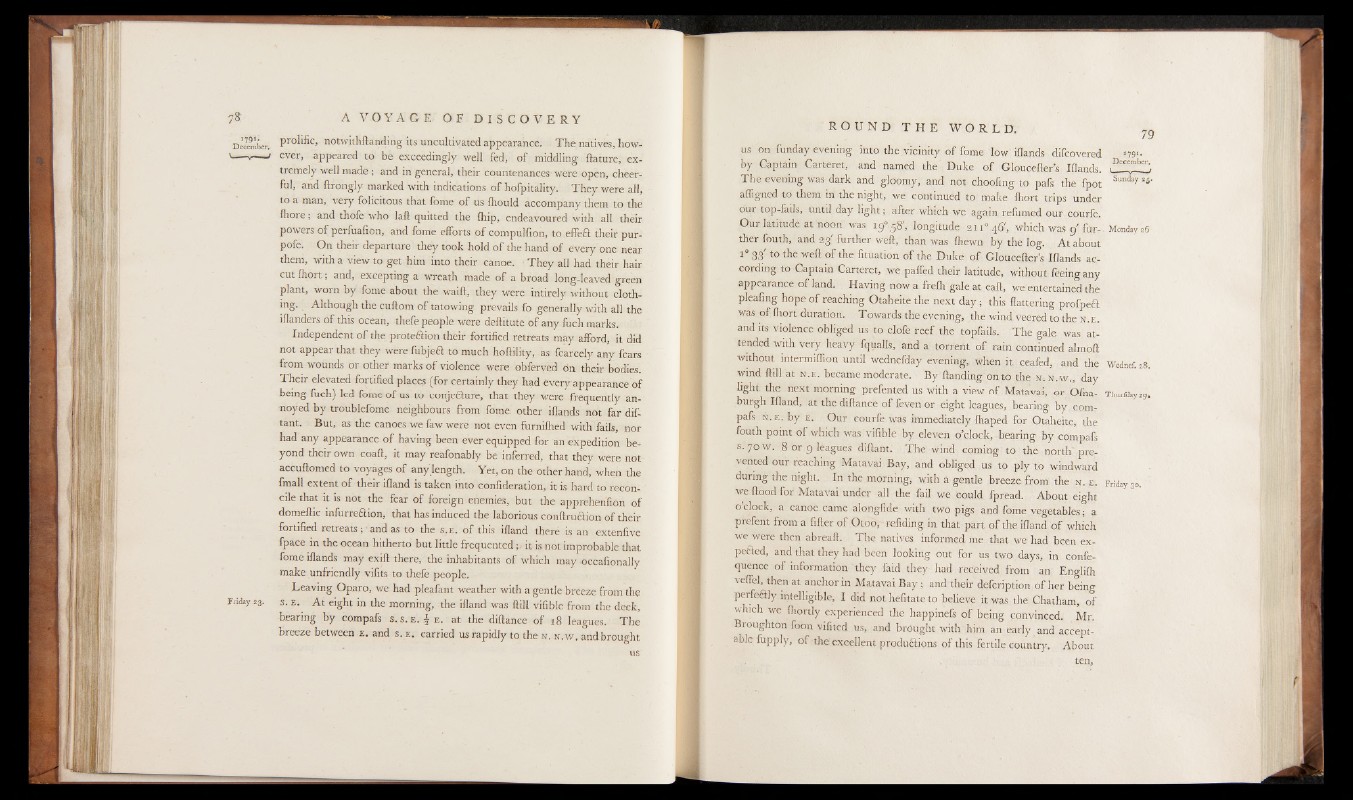
December. notwithftanding its uncultivated appearance. The natives, how-
'■ everJ appeared to be exceedingly well fed, of middling ftature, extremely
well made ; and in general, their countenances- were open, cheerful,
and ftrongly marked with indications of hofpitality. They were all,
to a man, very folicitous that fome of us (hould accompany them to the
Ihore; and thofe who laft quitted the fhip, endeavoured with all their
powers of perfuafion, and fome efforts of compulfion, to effeft their pur-
pofe. On their departure they took hold o f the hand of every one near
them, with a view to get him into their canoe. They all had their hair
cut fhort; and, excepting a wreath made of a broad long-leaved green
plant, worn by fome about the waifl, they were intirely without clothing.
Although the cuftom o f tatowing prevails fo generally with all the
iflanders of this ocean, thefe people were deftitute of any fuch marks.
Independent of the proteftion their fortified retreats may afford, it did
not appear that they were fubjeft to much hoftility, as fcarcely any fears
from wounds or other marks o f violence were obferved on their bodies.
Their elevated fortified places (Tor certainly they had every appearance of
being fuch) led fome of us to con jecture, that they were frequently annoyed
by troublefome neighbours from fome. other iflands not far dif-
tant. But, as the canoes we faw were not even furnifhed with fails, nor
had any appearance of having been ever equipped for an expedition beyond
their own coaft, it may reafonably be inferred, that they were not
accuflomed to voyages of any length. Yet, on the other hand, when the
fmall extent of their ifland is taken into confideration, it is hard to reconcile
that it is not the fear o f foreign enemies, but the apprehenfion of
domeftic infurreftion, that has induced the laborious conflruaion of their
fortified retreats; 1 and as to the s.e . of this ifland there is an extenfive
fpace in the ocean hitherto but little freq u en ted it is not improbable that
fome iflands may exift there, the inhabitants of which may occafionally
make unfriendly vifits to thefe people.
Leaving Oparo, we had pleafant weather with a gentle breeze from the
Friday 23. s. E. At eight in the morning, the ifland was ftill vifible from the deck,
bearing by compafs s. s. e . f e . at the diftance of 18 leagues. The
breeze between e . and s. e . carried us rapidly to the n . n .w . and brought
us
us on funday evening into the vicinity o f fome low iflands difeovered 1791*
by Captain Carteret, and named the Duke of Gloucefter’s Iflands. .Decembcr'.
The evening was dark and gloomy, and not choofing to pafs the fpot Sun<ky 25‘
afligned to them in the night, we continued to make fhort trips under
our top-fails, until day light; after which we again refumed our courfe.
Our latitude at noon was 19° 58', longitude 2110 46', which was 9' fur-. Monday 26
ther fouth, and 23 further weft, than was fhewn by the log. A t about
1° 33' to the weft of the fituation of the Duke o f Gloucefter’s Iflands according
to Captain Carteret, we palled their latitude, without feeing any
appearance of land. Having now a frefh gale at eaft, we.entertained the
pleafing hope of reaching Otaheite the next d a y ; this flattering profpea
was of fhort duration. Towards the evening, the wind veered to the N. E.
and its violence obliged us to clofe reef the topfails. The gale was attended
with very heavy fqualls, and a torrent o f rain continued almoft
without intermiflion until wednefday evening, when it ceafixf, and the Wednef.sS.
wind ftill at n.e . became moderate. By ftanding on to the n. n.w ., day
light, the next morning prefented us with a view of Matavai, or Ofna- Thur0ay29.
burgh Ifland, at the diftance of feven or eight leagues, bearing by . compafs
n. e . by e. Our courfe was immediately fhaped for Otaheite, the
fouth point o f which was vifible by eleven o’clock, bearing by compafs
s. 70 w. 8 or 9 leagues diftant. The wind coming to the north prevented
our reaching Matavai Bay, and obliged us to ply to windward
during the night. In the morning, with a gentle breeze from the n . e . Friday 30.
we flood for Matavai under all the fail we could fpread. About eight
o’clock, a canoe came alongfide with two pigs and fome vegetables; a
prefent from a filler of Otoor refiding in that part of the ifland o f which
we were then abreaft. The natives informed me that we had been ex-
pefted, and that they had been looking out for us two days, in confe-
quence of information they faid they had received from an Englifh
veflel, then at anchor in Matavai B a y ; and their defeription of her being
perfedlly intelligible, I did not hefitate to believe it was the Chatham, of
which we fliortly experienced the happinefs o f being convinced. Mr.
Broughton foon vifited us, and brought with him an early and acceptable
fupply, of the excellent produftions of this fertile country. About
ten,